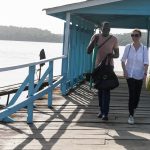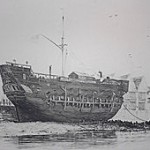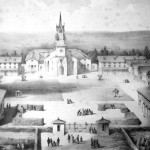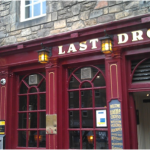
Transporting Convicts from New Zealand to Van Diemen’s Land
By Dr Kristyn Harman Senior Lecturer in History, University of Tasmania Like many New Zealanders, I grew up hearing stories about the Australian penal colonies, particularly anecdotes of London pickpockets and similarly desperate, impoverished characters, and the harsh and sometimes unfair regimes of punishment and deprivation under which such convicts lived and laboured. These […]

A Day in the Life: Convicts on board Prison Hulks
By Anna McKay, AHRC Collaborative Doctoral Partnership Student, National Maritime Museum & University of Leicester. In 1775 the outbreak of the American Revolution halted the transportation of felons to the colonies. One year later, with gaols overflowing, the Criminal Law Act -also known as the ‘Hulks Act’- was passed. Convicts awaiting transportation were […]

Upriver to Mazaruni Prison (Guyana)
One of the wonderful things about ‘blue skies’ research is the element of surprise that it can throw up. When I began work on ‘The Carceral Archipelago’ project, I had not planned to work on the British Caribbean. I had long been aware of early-modern British and Irish convict flows to islands like Barbados, […]

Ecuadorian thoughts on religion, power and the subaltern classes
The Iglesia de la Merced, in Quito, was built in 1737 on the remains of the original church that dated from 1538 – four years after the foundation of the city. The church is situated in the city centre, at less than one kilometre distance from all other main sites of the colonial period: the […]

Conceptualising Islands in History: Considering Bermuda and Gibraltar’s Prison Hulks
By Anna McKay, AHRC Collaborative Doctoral Partnership Student, National Maritime Museum & University of Leicester. As a relatively new addition to the University of Leicester’s School of History and the Carceral Archipelago project, over the last few months I feel as if I’ve undergone a thorough “academic baptism”. Since beginning my PhD studies in […]

Thinking sociologically about the history of convicts and penal colonies
In the early 1990s I had the privilege of studying with David Garland, then teaching and researching in Edinburgh University’s Law School. He had recently published a wonderful book – Punishment and Modern Society: a study in social theory – which remains as relevant and important today as it was then. Week by week, Professor […]

Thinking About Convict Objects, in French Guiana
In the Musée Départemental Alexandre Franconie in Cayenne there is a room dedicated to the history of the French colonial bagne (prison). Among the displays of artwork copied from the paintings of the well-known convict artist Francis Lagrange are a handful of objects made by convict craftsmen. One is by Lagrange himself, a small and […]

The Carceral Archipelago Conference, Leicester 13-16 September 2015
The Carceral Archipelago conference, held in Leicester from 13 to 16 September 2015, felt just like reading over thirty outstanding monographs in two-and-a-half days, getting to know their authors personally, and having the chance to reflect collectively about their mutual entanglements. It was an intense marathon through the burgeoning field of the global history of […]

Sounds in the silence of political exile
My recent discovery of Alexander Sochaczewski’s painting, Farewell to Europe!, in the Museum Pawilon-X in Warsaw compelled me to think anew about the experience of political exile and about the innate “wordlessness” that the state intended it to symbolize. Although Sochaczewski never sold a single painting during his life, today his work is viewed by thousands of visitors who […]

Dating the Social Death of the Eighteenth Century Criminal. By Rachel Bennett
In April 2015 I presented a paper at a conference held at the University of Leicester entitled ‘When is Death?’ The conference was organised by members of the Wellcome Trust funded project, Harnessing the Power of the Criminal Corpse. My PhD has been conducted as part of this project. The conference sought to investigate the […]

Recent Comments